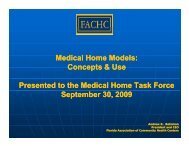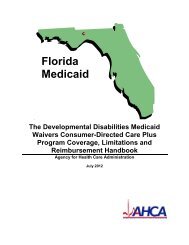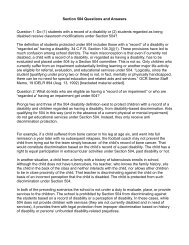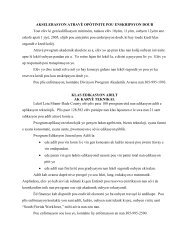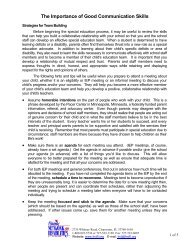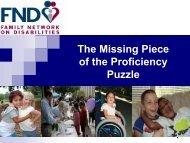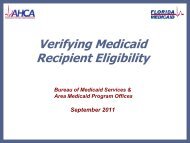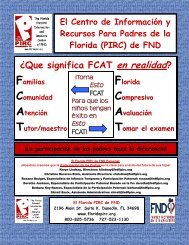Conflict Resolution - The Family Network on Disabilities of Florida
Conflict Resolution - The Family Network on Disabilities of Florida
Conflict Resolution - The Family Network on Disabilities of Florida
You also want an ePaper? Increase the reach of your titles
YUMPU automatically turns print PDFs into web optimized ePapers that Google loves.
Survival Skills Kit: For Every<br />
<str<strong>on</strong>g>C<strong>on</strong>flict</str<strong>on</strong>g>, <str<strong>on</strong>g>The</str<strong>on</strong>g>re is a Soluti<strong>on</strong>
• <str<strong>on</strong>g>Family</str<strong>on</strong>g> Driven<br />
• N<strong>on</strong>-Pr<strong>of</strong>it 501(c)3<br />
<str<strong>on</strong>g>Family</str<strong>on</strong>g> Driven: What makes FND unique is that the majority <strong>of</strong> our Board <strong>of</strong> Directors,<br />
all <strong>of</strong> our Management Staff and all <strong>of</strong> our Program Staff are parents or family members<br />
<strong>of</strong> pers<strong>on</strong>s with disabilities.<br />
When family members call FND, they not <strong>on</strong>ly receive the expertise and knowledge <strong>of</strong> a<br />
pr<strong>of</strong>essi<strong>on</strong>al, but also the compassi<strong>on</strong> and empathy <strong>of</strong> some<strong>on</strong>e who has walked (and<br />
c<strong>on</strong>tinues to walk) in their shoes.
♥<br />
♥<br />
We do NOT:<br />
Act As Attorneys<br />
We DO:<br />
♥ Provide Support<br />
Provide Informati<strong>on</strong><br />
Help Identify Opti<strong>on</strong>s<br />
Act as Attorneys: We d<strong>on</strong>’t represent families, and we d<strong>on</strong>’t give legal advice.<br />
Support: FND has been the statewide Parent to Parent since 1985, and the value <strong>of</strong> families getting<br />
support by networking with other families is built into everything we do. We <strong>of</strong>ten get calls from<br />
parents or other family members who just need to talk – and we’re there to listen.<br />
Informati<strong>on</strong>: Altogether, FND logs over 15,000 calls a year, most <strong>of</strong> them from parents, family<br />
members, or pr<strong>of</strong>essi<strong>on</strong>als who are looking for informati<strong>on</strong>. We have a large database <strong>of</strong> resources<br />
in <strong>Florida</strong>, and a library filled with disability-related informati<strong>on</strong>. Regardless <strong>of</strong> the questi<strong>on</strong>, our staff<br />
will go the extra mile to find an answer.<br />
Identify Opti<strong>on</strong>s: Our philosophy at FND is that it is not our role to tell families what to do. It is our<br />
role, however, to inform families <strong>of</strong> what their opti<strong>on</strong>s are – and encourage them to make their own<br />
decisi<strong>on</strong>s about what is right for their family.
Lack <strong>of</strong> Communicati<strong>on</strong><br />
Results In….<br />
Unclear Understanding <strong>of</strong>:<br />
• <str<strong>on</strong>g>The</str<strong>on</strong>g> law and process<br />
• Roles <strong>of</strong> team members<br />
• Paperwork and Procedures<br />
Sometimes parents and educators find themselves in c<strong>on</strong>flict with each other over<br />
issues related to the educati<strong>on</strong> <strong>of</strong> a child with a disability.<br />
<str<strong>on</strong>g>The</str<strong>on</strong>g>re are many possible causes <strong>of</strong> this type <strong>of</strong> c<strong>on</strong>flict.<br />
Sometimes parents are unsure <strong>of</strong> their roles and the roles <strong>of</strong> the other team members<br />
at the table and may be c<strong>on</strong>fused by the procedures and paperwork.<br />
Often, simple misunderstandings and disagreements can be solved by overcoming<br />
communicati<strong>on</strong> barriers.
Barriers to Communicati<strong>on</strong><br />
1. Negative History<br />
2. Language<br />
3. Emoti<strong>on</strong>al Resp<strong>on</strong>ses<br />
4. Jarg<strong>on</strong> and Alphabet Soup<br />
5. Fear or Intimidati<strong>on</strong><br />
Negative history or the participants’ past experiences can have a direct effect <strong>on</strong> communicati<strong>on</strong>.<br />
Often, because the team is trying to identify what the child needs, there is much discussi<strong>on</strong> about<br />
what the child cannot do.<br />
Hearing these negative statements can be difficult for the child’s parents.<br />
Both the educati<strong>on</strong> and disability worlds are filled with acr<strong>on</strong>yms and words that may be unfamiliar.<br />
It’s comm<strong>on</strong> for parents to feel overwhelmed by the sheer number <strong>of</strong> pr<strong>of</strong>essi<strong>on</strong>als sitting at the table<br />
with them.<br />
You can not assume that every<strong>on</strong>e has full understanding <strong>of</strong> the language both linguistically and in<br />
levels <strong>of</strong> vocabulary.
Collaborative Communicati<strong>on</strong><br />
encourages both parents and pr<strong>of</strong>essi<strong>on</strong>als to. . .<br />
• express h<strong>on</strong>est feelings<br />
• promote mutual respect<br />
• allow both discussi<strong>on</strong> and<br />
disagreement<br />
• respect cultural differences<br />
• remain child-focused<br />
When people are not giving open and h<strong>on</strong>est input, others are left to draw their own<br />
c<strong>on</strong>clusi<strong>on</strong>s – which may be far from the truth, and can result in unnecessary c<strong>on</strong>flict.<br />
Mutual respect occurs when every<strong>on</strong>e at the table acknowledges that each and every<br />
pers<strong>on</strong> has critical informati<strong>on</strong> to share.<br />
When individuals feel respected and valued, discussi<strong>on</strong> and even disagreement become<br />
possible without unresolved c<strong>on</strong>flict.<br />
When parents and educators communicate collaboratively, they can develop a<br />
partnership that is focused <strong>on</strong> what is best for the child.
<str<strong>on</strong>g>C<strong>on</strong>flict</str<strong>on</strong>g><br />
IDEIA/504<br />
• Two different laws.<br />
•Two different procedures<br />
<str<strong>on</strong>g>The</str<strong>on</strong>g>re are two laws and procedural safeguards for settling disagreements.<br />
Depending up<strong>on</strong> the issue, the procedures are different.
Free Appropriate Public Educati<strong>on</strong><br />
Secti<strong>on</strong> 504 defines FAPE as:<br />
“regular or special educati<strong>on</strong> and related aids and<br />
services that ... are designed”<br />
“to meet individual educati<strong>on</strong>al needs<br />
<strong>of</strong> handicapped pers<strong>on</strong>s as<br />
adequately as the needs <strong>of</strong> n<strong>on</strong>handicapped<br />
pers<strong>on</strong>s are met.”<br />
For example: If a child without a disability has access to an after school program, then a<br />
child with a disability will have the same access.<br />
If a child without a disability has access to class field trips, then a child with a disability<br />
will have the same access.<br />
Simply put, if a child without a disability has access to an educati<strong>on</strong>al day, then child with<br />
a disability can not be denied the same access with the use <strong>of</strong> supports to an equal<br />
educati<strong>on</strong>al day.<br />
Secti<strong>on</strong> 504 is a broader civil rights based law that extends bey<strong>on</strong>d the classroom and<br />
includes all school access.
Free Appropriate Public Educati<strong>on</strong><br />
IDEIA defines FAPE as:<br />
“special educati<strong>on</strong> and related services …<br />
“provided at public expense, under<br />
public supervisi<strong>on</strong> and directi<strong>on</strong> and<br />
without charge … in c<strong>on</strong>formity with the<br />
individualized educati<strong>on</strong> program …”<br />
IDEA focuses <strong>on</strong> special educati<strong>on</strong> (which <strong>Florida</strong> refers to as “specially designed<br />
instructi<strong>on</strong>”) with related services that meets the unique needs <strong>of</strong> the child and prepares<br />
the child for employment and independent living.<br />
FAPE under IDEA is based <strong>on</strong> the benefit <strong>of</strong> specially designed instructi<strong>on</strong> as outlined in<br />
the IEP to achieve the goals and objectives.<br />
* IEP can incorporate 504 requirements
Which Law<br />
• IDEIA S P & State Rules<br />
or<br />
• 504 Procedural Manual<br />
<str<strong>on</strong>g>The</str<strong>on</strong>g> very first step, regardless <strong>of</strong> which law the issue might fall under, is to be certain<br />
that the issue is valid.<br />
To seek clarificati<strong>on</strong> as to which law address the c<strong>on</strong>flict, parents may c<strong>on</strong>sult the 504<br />
Procedural Manual and the local Special Programs & Procedures for Excepti<strong>on</strong>al<br />
Students (SP&P) manual or the <strong>Florida</strong> State Rules that address IDEA.<br />
Both 504 and IDEA have Procedural Safeguards, or specific rules that govern<br />
complaints or grievances. It is important, before moving to a formal process, to be<br />
certain that a violati<strong>on</strong> did occur and that you are choosing the correct law to address<br />
the issues.
504 Procedural Safeguards<br />
Evaluati<strong>on</strong><br />
Informed <strong>of</strong> Proposed<br />
Acti<strong>on</strong>s<br />
Records<br />
Native Language<br />
Reevaluati<strong>on</strong>s<br />
Under Secti<strong>on</strong> 504, Procedural Safeguards include:<br />
- <str<strong>on</strong>g>The</str<strong>on</strong>g> right to have an evaluati<strong>on</strong> that draws <strong>on</strong> informati<strong>on</strong> from a variety <strong>of</strong> sources<br />
- <str<strong>on</strong>g>The</str<strong>on</strong>g> right to be informed <strong>of</strong> any proposed acti<strong>on</strong>s related to evaluati<strong>on</strong>, eligibility, and plan for<br />
services<br />
- An opportunity for the parent or guardian to examine all relevant records<br />
- <str<strong>on</strong>g>The</str<strong>on</strong>g> right to receive all informati<strong>on</strong> in the parent's/guardian's native language and primary mode <strong>of</strong><br />
communicati<strong>on</strong><br />
- <str<strong>on</strong>g>The</str<strong>on</strong>g> right to periodic reevaluati<strong>on</strong>s and an evaluati<strong>on</strong> before any significant change in<br />
program/service modificati<strong>on</strong>s (if the child is receiving special educati<strong>on</strong> or related services)
504 Procedural Safeguards<br />
Grievance<br />
Impartial hearing<br />
Counsel<br />
Appeal<br />
(C<strong>on</strong>tinued)<br />
- <str<strong>on</strong>g>The</str<strong>on</strong>g> right to file a grievance with the school district over an alleged violati<strong>on</strong> <strong>of</strong> Secti<strong>on</strong> 504<br />
regulati<strong>on</strong>s<br />
- <str<strong>on</strong>g>The</str<strong>on</strong>g> right to an impartial hearing if there is disagreement with the school district's proposed acti<strong>on</strong><br />
- <str<strong>on</strong>g>The</str<strong>on</strong>g> right to be represented by counsel in the impartial hearing process<br />
- <str<strong>on</strong>g>The</str<strong>on</strong>g> right to appeal the impartial hearing <strong>of</strong>ficer's decisi<strong>on</strong><br />
* <str<strong>on</strong>g>The</str<strong>on</strong>g>se procedures are outlined in the 504 procedural manual maintained by the school district
<str<strong>on</strong>g>C<strong>on</strong>flict</str<strong>on</strong>g> <str<strong>on</strong>g>Resoluti<strong>on</strong></str<strong>on</strong>g> Under 504<br />
• Meet with the teacher /Principal<br />
• 504 team meeting<br />
• Request meeting with the district 504<br />
• Regi<strong>on</strong>al complaint<br />
• Federal appeal<br />
Whenever possible, it is best to resolve c<strong>on</strong>flict informally.<br />
Often an issue, misunderstanding, or disagreement can be resolved during an informal meeting<br />
between the parents and the teacher.<br />
<str<strong>on</strong>g>The</str<strong>on</strong>g> principal <strong>of</strong> the school is resp<strong>on</strong>sible for the staff and procedures followed within his or her<br />
school. If resoluti<strong>on</strong> is not reached during an informal meeting with the teacher, rec<strong>on</strong>vene the 504<br />
team to include the principal.<br />
If resoluti<strong>on</strong> is not met, request a meeting with the district 504 compliance rep. to address your<br />
c<strong>on</strong>cerns.<br />
If resoluti<strong>on</strong> is not met, the next step may be to request a district level 504 hearing—the procedures<br />
to request a hearing are outlined in your districts 504 manual
<str<strong>on</strong>g>C<strong>on</strong>flict</str<strong>on</strong>g> <str<strong>on</strong>g>Resoluti<strong>on</strong></str<strong>on</strong>g> Under 504<br />
• Meet with the teacher /Principal<br />
• 504 team meeting<br />
• Request meeting with the district 504<br />
• Regi<strong>on</strong>al complaint<br />
• Federal appeal<br />
(c<strong>on</strong>tinued)<br />
Bey<strong>on</strong>d the right to a hearing guaranteed in 504’s Procedural Safeguards, a complaint may also be<br />
filed with the Office for Civil Rights itself (usually the regi<strong>on</strong>al <strong>of</strong>fice) which, in additi<strong>on</strong> to technical<br />
assistance activities, c<strong>on</strong>ducts compliance reviews and complaint investigati<strong>on</strong>s. <str<strong>on</strong>g>The</str<strong>on</strong>g> scope <strong>of</strong><br />
Secti<strong>on</strong> 504 complaints is very broad. It may be filed by any individual or organizati<strong>on</strong> and it may<br />
address individual student, class, or systemic issues. <str<strong>on</strong>g>The</str<strong>on</strong>g> complaint must be filed within 180 days <strong>of</strong><br />
the alleged discriminatory acti<strong>on</strong>, although the Regi<strong>on</strong>al Director has the authority to waive the time<br />
limit in some circumstances.<br />
<str<strong>on</strong>g>The</str<strong>on</strong>g> OCR will c<strong>on</strong>duct an investigati<strong>on</strong> <strong>of</strong> the complaint through data collecti<strong>on</strong> and written<br />
resp<strong>on</strong>ses to questi<strong>on</strong>s, and may c<strong>on</strong>duct an <strong>on</strong> site review. An informal process known as Early<br />
Complaint <str<strong>on</strong>g>Resoluti<strong>on</strong></str<strong>on</strong>g> (ECR) is available in individual, but not class, complaints.<br />
<str<strong>on</strong>g>The</str<strong>on</strong>g> OCR will issue a Letter <strong>of</strong> Finding, either with a "no violati<strong>on</strong>" c<strong>on</strong>clusi<strong>on</strong> or identifying violati<strong>on</strong>s<br />
and specifying corrective acti<strong>on</strong>s. Failure to implement the requested corrective acti<strong>on</strong>s may lead to<br />
an administrative hearing, with the possibility that Federal educati<strong>on</strong> funds may be terminated.
IDEIA Procedural Safeguards<br />
Free Appropriate Public Educati<strong>on</strong><br />
Evaluati<strong>on</strong><br />
Prior Notice<br />
Parental C<strong>on</strong>sent and Involvement<br />
Records<br />
Individualized Educati<strong>on</strong> Program/Plan<br />
Mediati<strong>on</strong> and Due Process Procedures<br />
Procedural Safeguards are the provisi<strong>on</strong>s in IDEIA which are designed to protect the<br />
rights <strong>of</strong> parents and their child with a disability, as well as to give families and schools a<br />
mechanism for resolving disputes.
Evaluati<strong>on</strong><br />
IS<br />
a team effort<br />
IDEA provides the right to an appropriate evaluati<strong>on</strong>. An evaluati<strong>on</strong> must be<br />
multidisciplinary. Evaluati<strong>on</strong> is the foundati<strong>on</strong> <strong>of</strong> the Individualized Educati<strong>on</strong><br />
Program/Plan, and specialized instructi<strong>on</strong> and aids cannot start without the completi<strong>on</strong><br />
<strong>of</strong> the evaluati<strong>on</strong>.<br />
If a parent disagrees with an evaluati<strong>on</strong> IDEA also provides the parent with the right to<br />
an independent educati<strong>on</strong>al evaluati<strong>on</strong> at no cost to parents. <str<strong>on</strong>g>The</str<strong>on</strong>g> parent does not have<br />
to disclose the reas<strong>on</strong>(s) why they disagree.<br />
Once a parent requests an IEE, the school district must – without unnecessary delay -<br />
either initiate a hearing to show that it's evaluati<strong>on</strong> is appropriate or provide the IEE at<br />
public expense. If a hearing determines that the school/district’s evaluati<strong>on</strong> was<br />
appropriate, the parent still has the right to an IEE, but must pay for it.
Prior Written Notice<br />
• Identificati<strong>on</strong><br />
• Evaluati<strong>on</strong><br />
• Placement for services<br />
• Changes in services<br />
• Acti<strong>on</strong> proposed or refused<br />
• Native language<br />
Prior written notice enables parents to exercise their right to be informed <strong>of</strong> all discussi<strong>on</strong>, testing,<br />
initiati<strong>on</strong>s <strong>of</strong>, and/or the ending <strong>of</strong> any educati<strong>on</strong>al service. <str<strong>on</strong>g>The</str<strong>on</strong>g>re are specific times when parents<br />
must be informed by prior notice.<br />
1: Identificati<strong>on</strong> – when the district suspects a child may have a disability<br />
2: Evaluati<strong>on</strong> – when the district wants to provide an evaluati<strong>on</strong><br />
3: Before any decisi<strong>on</strong> is made regarding placement.<br />
4: Before any decisi<strong>on</strong> is made about a change in services.<br />
5: If a parent requests a service, and the district refuses to provide the service, the district must<br />
provide written notice with an explanati<strong>on</strong> <strong>of</strong> why the service is being refused. If the district proposes<br />
an acti<strong>on</strong>, the parent must be notified in writing <strong>of</strong> what is being proposed.<br />
6: All written notice must be provided in a method <strong>of</strong> language that the parent understands.
Prior Notice must include<br />
• Explanati<strong>on</strong> <strong>of</strong> acti<strong>on</strong><br />
• Opti<strong>on</strong>s c<strong>on</strong>sidered<br />
• Relevant factors<br />
• Descripti<strong>on</strong> <strong>of</strong> evaluati<strong>on</strong>/tests<br />
• Explanati<strong>on</strong> <strong>of</strong> rights<br />
• Sources to c<strong>on</strong>tact<br />
A descripti<strong>on</strong> and explanati<strong>on</strong> <strong>of</strong> the acti<strong>on</strong> proposed or refused by the school. Example:<br />
<str<strong>on</strong>g>The</str<strong>on</strong>g> school district is proposing a change in placement. <str<strong>on</strong>g>The</str<strong>on</strong>g> district needs to provide an<br />
explanati<strong>on</strong> <strong>of</strong> why a change <strong>of</strong> placement is being proposed and describe the evaluati<strong>on</strong><br />
procedure, tests, or reports that were used to make a decisi<strong>on</strong> to change placement.<br />
<str<strong>on</strong>g>The</str<strong>on</strong>g> district has to provide notice <strong>of</strong> what opti<strong>on</strong>s were c<strong>on</strong>sidered and why the other<br />
opti<strong>on</strong>s were not selected.<br />
Parents must be provided a descripti<strong>on</strong> <strong>of</strong> all evaluati<strong>on</strong>s, tests and reports the school<br />
district will use as the basis for making any decisi<strong>on</strong>s about their children.<br />
Parents must be provided with an explanati<strong>on</strong> <strong>of</strong> their rights, in the language they<br />
understand.<br />
Parents must be provided with sources to c<strong>on</strong>tact to get assistance in helping them<br />
understand their rights under IDEA.
Parental C<strong>on</strong>sent and Involvement<br />
• Evaluati<strong>on</strong><br />
• Placement<br />
• Re-evaluati<strong>on</strong><br />
A parent’s written c<strong>on</strong>sent is necessary before the school district can:<br />
1: Test a child to determine eligibility for placement in an excepti<strong>on</strong>al student educati<strong>on</strong><br />
program.<br />
2: Place a child in a program for the first time.<br />
3: Re-evaluate a child.<br />
Parent c<strong>on</strong>sent is NOT required prior to a school district reviewing existing data as part<br />
<strong>of</strong> an evaluati<strong>on</strong> or re-evaluati<strong>on</strong>.<br />
If a parent does not resp<strong>on</strong>d to a school district request for c<strong>on</strong>sent to a re-evaluati<strong>on</strong>,<br />
the district may go ahead and c<strong>on</strong>duct the evaluati<strong>on</strong> IF it can show that it made<br />
reas<strong>on</strong>able efforts to obtain the c<strong>on</strong>sent.<br />
Parent c<strong>on</strong>sent must be “informed c<strong>on</strong>sent”. This means that a parent must fully<br />
understand what he or she is giving c<strong>on</strong>sent to.
Records<br />
• Documentati<strong>on</strong> used to determine eligibility<br />
• A list <strong>of</strong> types <strong>of</strong> educati<strong>on</strong>al records<br />
• Inspect and review<br />
• Explanati<strong>on</strong> <strong>of</strong> records<br />
• Receive copies<br />
• Representative Review<br />
Parents have the right to:<br />
•Receive a copy <strong>of</strong> the evaluati<strong>on</strong> report and an explanati<strong>on</strong> <strong>of</strong> other documentati<strong>on</strong><br />
used to determine their child’s eligibility.<br />
•Receive, up<strong>on</strong> request, a list <strong>of</strong> types <strong>of</strong> educati<strong>on</strong>al records kept <strong>on</strong> their child, and<br />
informed <strong>of</strong> how they can gain access to them.<br />
•Inspect and review all <strong>of</strong> their child’s records.<br />
<str<strong>on</strong>g>The</str<strong>on</strong>g> school must comply with the request:<br />
•without unnecessary delay<br />
•before an IEP meeting, due process hearing, or any hearing related to the child’s<br />
placement in an interim alternative educati<strong>on</strong>al setting, and<br />
•within 30 days.
Records<br />
(c<strong>on</strong>tinued)<br />
• Documentati<strong>on</strong> used to determine eligibility<br />
• A list <strong>of</strong> types <strong>of</strong> educati<strong>on</strong>al records<br />
• Inspect and review<br />
• Explanati<strong>on</strong> <strong>of</strong> records<br />
• Receive copies<br />
• Representative Review<br />
•Have some<strong>on</strong>e from the school district explain or interpret any item in the records.<br />
•Receive copies <strong>of</strong> the records. <str<strong>on</strong>g>The</str<strong>on</strong>g> school district may charge a fee for copies, if a<br />
charge does not prevent you from reviewing the records.<br />
•Have a representative inspect and review the records.<br />
•Parents do NOT have the right to inspect copies <strong>of</strong>: a teacher’s pers<strong>on</strong>al notes that are<br />
shared <strong>on</strong>ly with a substitute teacher.<br />
•Other types <strong>of</strong> documentati<strong>on</strong> parents are allowed to review are anecdotal notes and<br />
emails.
Records<br />
FERPA<br />
<str<strong>on</strong>g>The</str<strong>on</strong>g> School District is resp<strong>on</strong>sible for protecting the<br />
c<strong>on</strong>fidentiality <strong>of</strong> your child’s records.<br />
•Releasing informati<strong>on</strong><br />
•C<strong>on</strong>fidentiality <strong>of</strong> other children<br />
•Who has reviewed<br />
<str<strong>on</strong>g>The</str<strong>on</strong>g> school district must protect a child’s educati<strong>on</strong>al records.<br />
1: <str<strong>on</strong>g>The</str<strong>on</strong>g> district can <strong>on</strong>ly release informati<strong>on</strong> with your c<strong>on</strong>sent.<br />
2: <str<strong>on</strong>g>The</str<strong>on</strong>g> district can withhold documentati<strong>on</strong> that is in a child’s record ONLY if that record<br />
c<strong>on</strong>tains informati<strong>on</strong> <strong>on</strong> more than <strong>on</strong>e child.<br />
3: <str<strong>on</strong>g>The</str<strong>on</strong>g> district must keep a record/list <strong>of</strong> any<strong>on</strong>e who has had access to a child’s<br />
records.
Individual Educati<strong>on</strong> Program<br />
“….ensure that <strong>on</strong>e or both parents <strong>of</strong><br />
a child with a disability are afforded<br />
the opportunity to participate….”<br />
•Notificati<strong>on</strong><br />
•Scheduling<br />
•Methods <strong>of</strong> participati<strong>on</strong><br />
•Native Language<br />
Parents have the right to:<br />
1: Notificati<strong>on</strong>: to be notified <strong>of</strong> the meeting in advance so that they may make<br />
arrangements to participate.<br />
2: Scheduling: to have the meeting scheduled at a mutually agreed up<strong>on</strong> time<br />
3: Methods <strong>of</strong> participati<strong>on</strong>: If neither parent can attend, the IEP Team shall use other<br />
methods to ensure participati<strong>on</strong> – such as c<strong>on</strong>ference calling.<br />
4: Native Language: <str<strong>on</strong>g>The</str<strong>on</strong>g> school district must ensure that the parent understands the<br />
proceedings at the meeting, including making arrangements for an interpreter (sign<br />
language or other language).
Mediati<strong>on</strong><br />
May be used to resolve disagreements<br />
relating to the identificati<strong>on</strong>, evaluati<strong>on</strong>,<br />
educati<strong>on</strong>al placement or the provisi<strong>on</strong> <strong>of</strong><br />
a free appropriate public educati<strong>on</strong> to your<br />
child, or whenever a due process hearing<br />
is requested.<br />
Mediati<strong>on</strong> is an informal way to resolve disagreements between the parent and the<br />
district. <str<strong>on</strong>g>The</str<strong>on</strong>g> Department <strong>of</strong> Educati<strong>on</strong> makes mediati<strong>on</strong> available at no cost to you or<br />
the school district.
Mediati<strong>on</strong><br />
Mutual agreement<br />
Qualified impartial pers<strong>on</strong><br />
May be requested at any time<br />
Timely manner<br />
C<strong>on</strong>fidential<br />
Deny or delay<br />
1: Mediati<strong>on</strong> is voluntary for both parties<br />
2: <str<strong>on</strong>g>The</str<strong>on</strong>g> mediator has to be qualified and impartial. <str<strong>on</strong>g>The</str<strong>on</strong>g> mediator has to have been trained in effective<br />
mediati<strong>on</strong> techniques.<br />
3: Mediati<strong>on</strong> may be requested at any time by either party.<br />
4: Shall be scheduled in a timely manner and shall be held at a c<strong>on</strong>venient locati<strong>on</strong> to both parties.<br />
5: Is c<strong>on</strong>fidential so that discussi<strong>on</strong>s that occur during mediati<strong>on</strong> may not be used as evidence in a<br />
due process hearing or civil proceeding.<br />
6: Shall not be used to deny or delay the right to a due process hearing, or to deny other rights<br />
afforded to parents including a state complaint.
State Complaint<br />
If a parent believes that the school district has<br />
violated any <strong>of</strong> the requirements <strong>of</strong> the<br />
Individuals with <strong>Disabilities</strong> Educati<strong>on</strong> Act,<br />
he or she may file a formal written<br />
complaint.<br />
<str<strong>on</strong>g>The</str<strong>on</strong>g>re are two ways to file a state complaint:<br />
1. A written complaint with the superintendent (Local Educati<strong>on</strong> Complaint)<br />
2. A written complaint with the <strong>Florida</strong> Department <strong>of</strong> Educati<strong>on</strong> (State Agency Complaint)<br />
A written complaint must include:<br />
• A statement <strong>of</strong> how a requirement <strong>of</strong> IDEA has not been met<br />
• Explanati<strong>on</strong> <strong>of</strong> the facts <strong>on</strong> which the statement is based<br />
• A final decisi<strong>on</strong> must be made within 60 days <strong>of</strong> the time the complaint is received by<br />
the Department <strong>of</strong> Educati<strong>on</strong>.
Due Process<br />
Should be c<strong>on</strong>sidered <strong>on</strong>ly when all else<br />
has failed or a child is in danger.<br />
Never <strong>on</strong> procedural violati<strong>on</strong>s<br />
To prevail in due process there has to be a<br />
situati<strong>on</strong> that results in a loss <strong>of</strong> FAPE<br />
Example: failure to evaluate an area necessary for a child to benefit from specially<br />
designed instructi<strong>on</strong>.<br />
Written request = letter to superintendent<br />
Should have legal representati<strong>on</strong> before requesting due process hearing<br />
Would have to be a denial <strong>of</strong> FAPE.
Due Process Hearing<br />
• to be represented by counsel<br />
• to present evidence<br />
• to have child attend<br />
• to examine and compel witnesses<br />
• to determine open or closed hearing<br />
• to have copies <strong>of</strong> final orders<br />
• to be informed <strong>of</strong> free or low cost legal support<br />
45 days to complete the Due<br />
Process hearing and arrive at a final<br />
order
Both parties have<br />
30 days to appeal<br />
the final order<br />
After the final decisi<strong>on</strong>, both parties have 30 days to appeal. During the 30 days, the<br />
final order is binding.
Stay Put<br />
Your child may remain in his or her present<br />
educati<strong>on</strong><br />
placement during due<br />
process hearing<br />
and/or appeal<br />
During the time that any administrative or judicial proceedings are taking place, a child is<br />
to remain in his or her present educati<strong>on</strong>al placement unless the parents and school<br />
district agree otherwise. If an Administrative Law Judge agrees with the parents that a<br />
change <strong>of</strong> placement is appropriate, the new placement must be provided during the<br />
appeal process.
Attorneys’ Fees<br />
Only a US District or Circuit Court may award fees<br />
Not awarded for IEP participati<strong>on</strong><br />
Not awarded for mediati<strong>on</strong><br />
Court may reduce fees<br />
Only a district court <strong>of</strong> the United States or a state circuit court may award reas<strong>on</strong>able attorney’s fees<br />
as part <strong>of</strong> the cost to the parent <strong>of</strong> a child with a disability. A parent who prevails in a due process<br />
must seek attorney’s fees in a further proceeding in a federal district court or state circuit court.<br />
<str<strong>on</strong>g>The</str<strong>on</strong>g> court may refuse a request for fees for services if the district has made a written <strong>of</strong>fer <strong>of</strong><br />
settlement within appropriate timelines, the parent has refused the settlement, and the court decided a<br />
settlement not more favorable to the parent. <str<strong>on</strong>g>The</str<strong>on</strong>g> attorney fees must be paid if parent was<br />
“substantially justified” in rejecting the <strong>of</strong>fer. Attorney fees are not awarded for IEP planning meetings<br />
(unless ordered by judicial acti<strong>on</strong> or result <strong>of</strong> a due process hearing). Fees are not paid for mediati<strong>on</strong><br />
work prior to a due process<br />
Court may reduce fees:<br />
If the parent unreas<strong>on</strong>ably prol<strong>on</strong>ged the time it took to resolve the dispute,<br />
Attorney’s hourly rate or time spent was excessive, or<br />
<str<strong>on</strong>g>The</str<strong>on</strong>g>re was a failure to provide the district with informati<strong>on</strong> as required under procedural<br />
safeguards.<br />
Attorney’s fees cannot be reduced if the State or school district unreas<strong>on</strong>ably delayed resoluti<strong>on</strong> or<br />
violated the requirement to disclose informati<strong>on</strong>.
Opti<strong>on</strong>s for Private School<br />
Placement.<br />
Parents Places – Parent Pays<br />
School Places – School Pays<br />
Court Orders – School Pays<br />
<str<strong>on</strong>g>The</str<strong>on</strong>g> school district is not required to pay for the cost <strong>of</strong> the educati<strong>on</strong>, including special<br />
educati<strong>on</strong> and related services, for a child with a disability at a private school or facility if<br />
the district has made a free appropriate public educati<strong>on</strong> available to the child and the<br />
parents elect to place the child in a private school or facility.<br />
If a child is placed by the parent in a private school, without school approval, the parent<br />
pays unless they are using a voucher. It is important to understand that the Procedural<br />
Safeguards will end with the use <strong>of</strong> a voucher program.<br />
If a school can not provide FAPE, they can place the child in a private school setting at<br />
the cost <strong>of</strong> the school.<br />
If a school fails to provide FAPE, the court may require a school to pay!
Discipline<br />
•Under 10 days no right to educati<strong>on</strong><br />
•Manifestati<strong>on</strong> determinati<strong>on</strong><br />
•On 11th day school must provide educati<strong>on</strong><br />
•11th day services or change <strong>of</strong> placement<br />
•Expedited Hearing<br />
•Functi<strong>on</strong>al Behavior Assessment<br />
•Positive behavior plan<br />
1: Short Term Removals: To the extent that children without disabilities would be<br />
disciplined, school district pers<strong>on</strong>nel may remove a child with disabilities for up to ten<br />
c<strong>on</strong>secutive or cumulative school days in a school year when the child has violated the<br />
district’s Code <strong>of</strong> Student C<strong>on</strong>duct.<br />
2: When a child has been removed for more than 10 days in a school year, a<br />
manifestati<strong>on</strong> determinati<strong>on</strong> must be scheduled to determine if the child’s disability<br />
impaired his/her ability to understand the impact and c<strong>on</strong>sequences <strong>of</strong> the behavior. If<br />
the IEP is inappropriately written to meet the child’s needs or if the placement is<br />
inappropriate – the behaviors are automatically c<strong>on</strong>sidered to be a manifestati<strong>on</strong> <strong>of</strong> the<br />
child’s disability.
Discipline<br />
(c<strong>on</strong>tinued)<br />
•Under 10 days no right to educati<strong>on</strong><br />
•Manifestati<strong>on</strong> determinati<strong>on</strong><br />
•On 11th day school must provide educati<strong>on</strong><br />
•11th day services or change <strong>of</strong> placement<br />
•Expedited Hearing<br />
•Functi<strong>on</strong>al Behavior Assessment<br />
•Positive behavior plan<br />
3: Whenever a child is removed for more than 10 days in a school year, the school<br />
district must provide services to the extent necessary to enable the child to progress in<br />
the general curriculum and appropriately advance toward achieving the goals <strong>on</strong> the IEP.<br />
<str<strong>on</strong>g>The</str<strong>on</strong>g> IEP Team determines if the behavior was related to the child’s disability.<br />
4: If parents disagree with the IEP Team decisi<strong>on</strong>, they have the right to request an<br />
expedited due process hearing.<br />
5: Plan for a functi<strong>on</strong>al behavioral assessment and develop a behavioral interventi<strong>on</strong><br />
plan, or modify an existing plan to address why the infracti<strong>on</strong> occurred.
Interim Alternative Educati<strong>on</strong>al Settings<br />
If a student with a disability:<br />
• Carries a weap<strong>on</strong><br />
• Possesses, uses, sells or solicits illegal drugs<br />
Up to 45 calendar days without the<br />
parent’s written c<strong>on</strong>sent<br />
An interim educati<strong>on</strong>al setting is a different locati<strong>on</strong> where educati<strong>on</strong>al services are<br />
provided for a specific time period due to disciplinary reas<strong>on</strong>s. <str<strong>on</strong>g>The</str<strong>on</strong>g> IAES must be<br />
determined by the IEP Team and must be selected so as to enable the child with a<br />
disability to c<strong>on</strong>tinue to progress toward IEP goals.<br />
<str<strong>on</strong>g>The</str<strong>on</strong>g> school district may place a child in an IAES for up to 45 calendar days without the<br />
parents c<strong>on</strong>sent. When the decisi<strong>on</strong> to place your child in a IAES has been made, the<br />
school district must notify the parent <strong>of</strong> this decisi<strong>on</strong> that day and provide you with a copy<br />
<strong>of</strong> the notice <strong>of</strong> your rights under IDEA (procedural safeguards).<br />
If parents disagree with the decisi<strong>on</strong> and request an expedited hearing, the child will<br />
remain in the IAES placement unless the parents and the school agree otherwise or until<br />
the 45 days have passed.
Steps to <str<strong>on</strong>g>C<strong>on</strong>flict</str<strong>on</strong>g> <str<strong>on</strong>g>Resoluti<strong>on</strong></str<strong>on</strong>g><br />
Federal Appeal<br />
Regi<strong>on</strong>al Complaint<br />
504 Hearing<br />
District 504 Compliance Rep<br />
Due Process<br />
504 Team<br />
State Complaint<br />
Teacher / Principal<br />
Mediati<strong>on</strong>/<str<strong>on</strong>g>Resoluti<strong>on</strong></str<strong>on</strong>g> Meeting<br />
Teacher / Principal<br />
District ESE Pers<strong>on</strong>nel<br />
IEP Team<br />
Here is a graphic representati<strong>on</strong> <strong>of</strong> both sides <strong>of</strong> the steps: 504 and IDEA.<br />
If parents are going up the stairs and not reaching resoluti<strong>on</strong>, it’s possible that they are<br />
climbing the wr<strong>on</strong>g side <strong>of</strong> the steps.
Introducing:<br />
FND University<br />
• Absolutely free!<br />
• Available 24 hours<br />
• Interactive <strong>on</strong>line distance learning system<br />
• Trainings at your home at your c<strong>on</strong>venience<br />
• Transcript <strong>of</strong> all courses<br />
• Certificates <strong>of</strong> completi<strong>on</strong><br />
Website: http://fnduniversity.org
For more informati<strong>on</strong> please c<strong>on</strong>tact:<br />
<str<strong>on</strong>g>Family</str<strong>on</strong>g> <str<strong>on</strong>g>Network</str<strong>on</strong>g> <strong>on</strong> <strong>Disabilities</strong><br />
2196 Main St., Suite K<br />
Dunedin, FL 34698<br />
(727) 523-1130<br />
(800) 825-5736<br />
fnd@fndusa.org<br />
www.fndusa.org<br />
Please complete our evaluati<strong>on</strong><br />
Click here to c<strong>on</strong>tinue<br />
<str<strong>on</strong>g>The</str<strong>on</strong>g> c<strong>on</strong>tents <strong>of</strong> this presentati<strong>on</strong> were developed under a grant from the US Department <strong>of</strong> Educati<strong>on</strong>,<br />
#H328M110010 and #H328M110026. However, those c<strong>on</strong>tents do not necessarily represent the policy <strong>of</strong><br />
the US Department <strong>of</strong> Educati<strong>on</strong>, and you should not assume endorsement by the Federal Government.<br />
Project Officer, Lisa Gorove.<br />
© <str<strong>on</strong>g>Family</str<strong>on</strong>g> <str<strong>on</strong>g>Network</str<strong>on</strong>g> <strong>on</strong> <strong>Disabilities</strong>, Inc.




